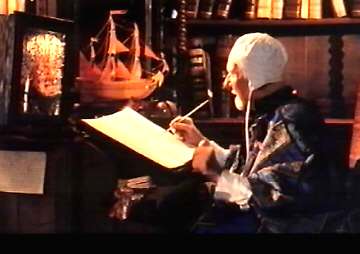
ACT III
SCENE i
The "new man" Caliban called for at the end of the previous scene is here (Garber 867): Ferdinand has been assigned the log-carrying chores but he says, "The mistress which I serve quickens what's dead, / And makes my labors pleasures" (III.i.6-7), and that she weeps to see him work. Miranda herself approaches and Prospero is not far behind, but cloaked in invisibility, so Miranda thinks he's off studying for three hours. She volunteers to do the log-carrying, but Ferdinand will not hear of such a dishonor. "Poor worm, thou art infected" (III.i.31), says Prospero, presumably regarding his daughter's being smitten. Ferdinand asks her her name, she tells him and then realizes she has disobeyed her father in this, and then Ferdinand rhapsodizes in wordplay on the name Miranda. He says he has fancied various women before but has never been bowled over by all virtues in one woman as he is now (III.i.39ff).
| In this play, the younger generation is uncontaminated by the world, not unacquainted with it (Goddard, II 290), although Miranda acknowledges that she has never seen any women and only her father and Ferdinand, but that she cannot imagine any man more glorious than Ferdinand. She offers to be his wife -- "I am your wife, if you will marry me; / If not, I'll die your maid" (III.i.83-84) -- and they pledge themselves to each other, Ferdinand "thus humble ever" (III.i.87). They are willing to be each other's slaves. It all happens fast, but Miranda is acting without artifice. Prospero is delighted for them. "I'll to my book, / For yet ere supper-time must I perform / Much business appertaining" (III.i.94-96). |

|
SCENE ii
Caliban, Trinculo, and Stephano are still boozing it up. There are only three of them, and they know of only five people total on the island: "if th' other two be brain'd like us, the state totters" (III.ii.6-7). Caliban wants them to revenge his being cheated out of his island. Yet even more extreme than the other batch of castaways with their inappropriate values of the court, there's a quibble about whether Caliban should be appointed Stephano's lieutenant or his standard-bearer, petty animosities between Caliban and Trinculo (which Ariel exacerbates with a ventriloquism trick that gets Trinculo beaten by Stephano), and even a plot to murder Prospero and make Miranda Stephano's queen. Admittedly, this last is the plot hatched by Caliban, who realizes they'll need to seize Prospero's books before knocking a nail into his head (III.ii.61) "or with a log / Batter his skull, or paunch him with a stake, / Or cut his wezand [windpipe] with thy knife" (III.ii.89-91). Despite this viciousness, Caliban can also deliver an enchantingly lyrical passage regarding the sounds on the island when the other two are disturbed by Ariel's tabor and pipe accompaniment of their "Flout 'em and scout 'em" ("Deride them and jeer at them") song:
Be not afeard, the isle is full of noises,Yet Caliban is called, and repeatedly lives down to the epithets, "Moon-calf" -- a deformed calf born under the malign influence of the moon (Asimov 662) -- and "monster."
Sounds, and sweet airs, that give delight and hurt not.
Sometimes a thousand twangling instruments
Will hum about mine ears; and sometime voices,
That if I then had wak'd after long sleep,
Will make me sleep again, and then in dreaming,
The clouds methought would open, and show riches
Ready to drop upon me, that when I wak'd
I cried to dream again.
(III.ii.135-143)
SCENE iii

|
Alonso, Sebastian, and the rest have been trekking about and old Gonzalo recommends a rest: "My old bones ache. Here's a maze trod indeed / Through forthrights and meanders!" (III.iii.2-3) -- perhaps referring to Burghley's gout and the pathways of his Theobalds estate (Ogburn and Ogburn 543-544, 629). Antonio and Sebastian still plan murder, tonight. Strange music is heard and "several strange Shapes" bring in a picnic feast and dance about, with Prospero present but invisible. As the nobles salivate over but dread the "viands," Ariel appears as a harpy and makes the banquet disappear. He then berates their evils: "on this island / Where man doth not inhabit -- you 'mongst men / Being most unfit to live" (III.iii.56-58). When the men draw their swords, Ariel (or wherever they perceive the voice to come from) calls them fools to think that that is of any potential effect. Ariel charges them with the ill treatment of Prospero, cows them, and vanishes in thunder. Those "Shapes" dance again, mocking the court idiots and whisking away the banquet. |
Prospero revels in his power over them and their belief that Ferdinand is dead. Alonso seems truly repentent and Gonzalo comments on the guilt of the three, advising others to follow the guilty to prevent them from rash acts, presumably suicide.